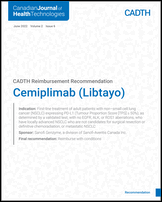|
Initiation
|
| 1. Treatment with cemiplimab should only be reimbursed in adult patients with all of the following: 1.1. Previously untreated stage IV NSCLC, or stage IIIB or IIIC NSCLC not amenable to curative therapy 1.2. PD-L1 strongly positive tumours (TPS ≥ 50%) 1.3. Good performance status | Patients in the EMPOWER-Lung 1 trial had these characteristics, with the exception that only patients with an ECOG performance status of 0 or 1 were eligible. | pERC noted that patients who progress at least 6 months after their last dose of adjuvant or neoadjuvant chemotherapy or immunotherapy should be eligible to receive cemiplimab. pERC agreed with the clinical experts that patients with an ECOG performance status of up to 2 may be considered for eligibility based on data showing efficacy of other treatments such as chemotherapy in these patients. |
| 2. Patients should not have any of the following: 2.1. Tumours with EGFR, ALK, or ROS1 aberrations 2.2. A contraindication to immunotherapy 2.3. Uncontrolled and symptomatic CNS metastases | There is no evidence to support a benefit of cemiplimab treatment in patients with these characteristics as they were excluded from the EMPOWER-Lung 1 trial. | Although never smokers were excluded from the EMPOWER-Lung 1 trial, pERC noted that they should not be excluded from treatment with cemiplimab. pERC noted that CNS imaging should not be mandated unless patients have symptomatic CNS metastases. |
|
Renewal
|
| 3. Reimbursement of cemiplimab should be renewed for patients who demonstrate a continued response to treatment defined as absence of disease progression. 3.1. Assessment for renewal should be based on clinical and radiographic evaluation every 3 to 4 months. | In clinical practice, treatment response is evaluated clinically at each visit, and radiologically approximately every 3 to 4 months. This is aligned with the frequency of radiographic evaluation in the EMPOWER-Lung 1 trial, which was performed every 9 weeks (3 cycles) until disease progression. | — |
| 4. Cemiplimab treatment should be reimbursed for a maximum of 108 weeks. | There is no evidence to demonstrate a benefit of cemiplimab in patients treated beyond 108 weeks. Patients in the cemiplimab arm of the EMPOWER-Lung 1 received cemiplimab monotherapy for up to 108 weeks (36 treatment cycles). | pERC noted that patients who completed 2 years of cemiplimab treatment and progressed after the end of treatment should be eligible for retreatment for up to 17 cycles (1 year). pERC also noted that patients who discontinue treatment before completion due to toxicity can restart treatment as long as the toxicity has resolved. |
|
Prescribing
|
| 5. Treatment should be prescribed by clinicians with expertise and experience in treating NSCLC. The treatment should be supervised and delivered in outpatient specialized oncology clinics with expertise in systemic therapy delivery and management of immunotherapy-related side effects. | This will ensure that treatment is prescribed only for appropriate patients and adverse effects are managed in an optimized and timely manner. | — |
|
Pricing
|
| 6. Cemiplimab should be negotiated so that it does not exceed the drug program cost of treatment with pembrolizumab. | No evidence was reviewed that supports a clinical benefit for cemiplimab compared to pembrolizumab for this indication. | — |
|
Feasibility of adoption
|
| 7. The feasibility of adoption of cemiplimab must be addressed. | At the submitted price, the magnitude of uncertainty in the budget impact must be addressed to ensure the feasibility of adoption, given the difference between the sponsor’s estimate and CADTH’s estimate. | — |
